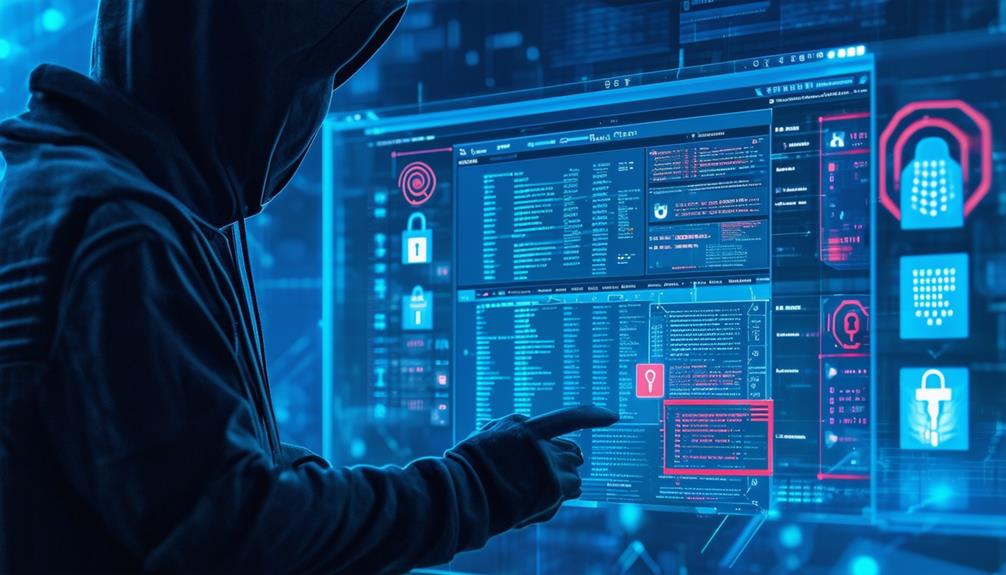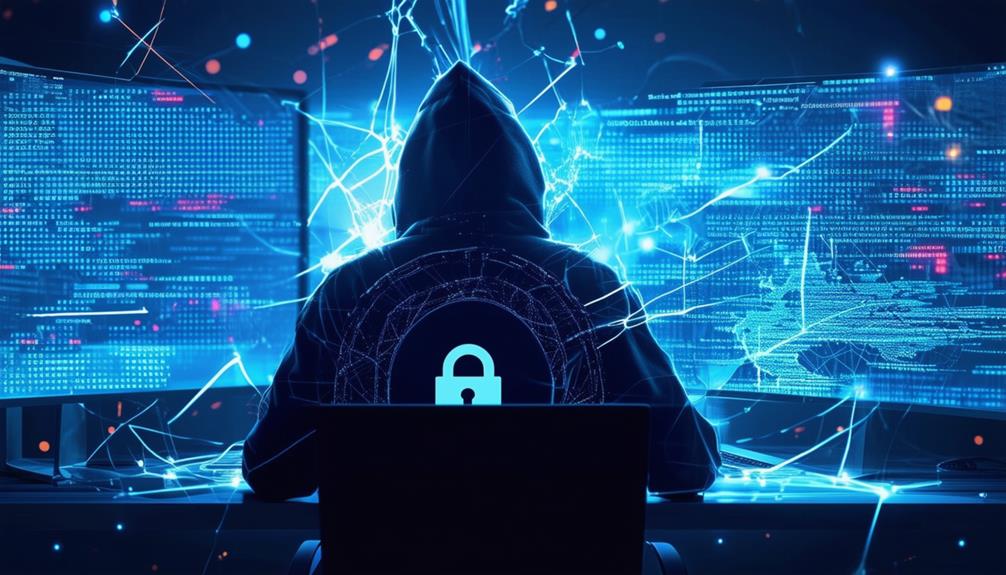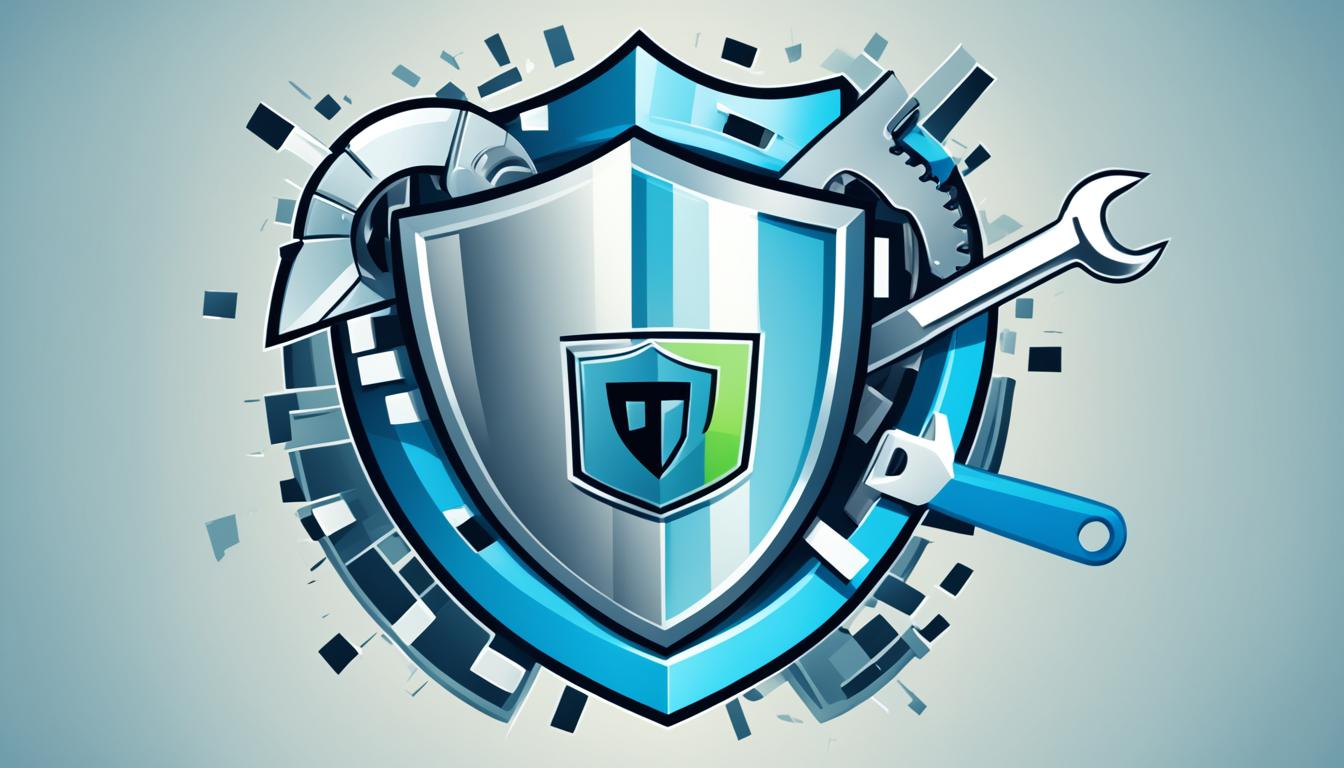Ethical hacking, or penetration testing, is a legal and proactive way to identify and fortify security weaknesses, preventing cyber-attacks and safeguarding sensitive data. White hat hackers play a crucial role in enhancing overall system protection by preemptively identifying vulnerabilities and strengthening security measures. However, ethical hacking also comes with security risks, financial costs, and ethical concerns that need to be carefully balanced. Understanding the stages and tools of ethical hacking can provide insight into its intricacies and benefits. By delving deeper into this practice, one can gain a more thorough understanding of its pros and cons.
Key Takeaways
- Pro: Proactively identifies vulnerabilities to strengthen security measures.
- Pro: Prevents cyber-attacks and safeguards sensitive data.
- Con: Raises security issues and financial costs.
- Con: Raises ethical concerns and potential privacy invasion.
- Balancing act: Requires a delicate balance between security and ethics.
What Is Ethical Hacking?
Ethical hacking, a legally sanctioned practice, involves identifying vulnerabilities in systems with the explicit permission of the owner. This process is vital in enhancing security measures as it allows for preemptive identification and resolution of potential weaknesses that could be exploited by malicious actors.
By simulating real-world cyber-attacks, ethical hackers can uncover vulnerabilities that might otherwise remain undetected, enabling organizations to strengthen their defense mechanisms proactively.
Through ethical hacking, security professionals, also known as white hat hackers, employ their expertise to fortify systems and protect sensitive data from potential breaches. The Certified Ethical Hacker certification serves as a validation of the skills and knowledge required for this specialized role.
Ultimately, the primary goal of ethical hacking is to bolster cybersecurity defenses, mitigate risks, and shield organizations against the ever-evolving landscape of cyber threats.
Types of Hackers

Different categories of hackers exist in the cybersecurity landscape, each with distinct motivations and approaches to interacting with computer systems. Black hat hackers engage in unauthorized activities for personal gain or malicious intent, often causing harm to individuals or organizations.
On the other hand, white hat hackers, also known as ethical hackers, work within legal boundaries to identify vulnerabilities and enhance security measures. Grey hat hackers operate in a morally ambiguous manner, sometimes for ethical reasons but without explicit permission, blurring the lines between ethical and unethical practices.
Apart from these categories, there are also hacktivists who leverage their hacking skills to advance social or political causes. State-sponsored hackers, backed by governments, engage in cyber espionage or sabotage activities to further national interests.
Understanding the motivations and behaviors of these different types of hackers is essential for cybersecurity professionals to develop effective defense strategies against malicious cyber activities.
Advantages of Ethical Hacking

Within the field of cybersecurity, the practice of ethical hacking serves as an essential tool for proactively identifying and addressing vulnerabilities in computer systems.
The advantages of ethical hacking are manifold. Firstly, it helps organizations by identifying weaknesses in their systems that malicious hackers could exploit. By uncovering these vulnerabilities, ethical hackers enable companies to strengthen their security measures, thereby preventing potential cyber-attacks and safeguarding sensitive data.
Additionally, obtaining a Certified Ethical Hacker certification signifies a high level of expertise in ethical hacking practices, reassuring organizations of the professional skills employed in securing their systems.
In addition, ethical hacking ensures that a code of conduct is followed, protecting critical information such as credit card data from falling into the wrong hands. Ultimately, white hat hackers, as ethical hackers are often referred to, play an important role in enhancing data security and fortifying the overall cybersecurity posture of organizations.
Disadvantages of Ethical Hacking

Potential risks and drawbacks are associated with the practice of ethical hacking, highlighting the need for careful consideration and management of its implementation.
When delving into the domain of ethical hacking, several disadvantages come to light, including:
- Security Issues: Despite the intention to enhance security, ethical hacking can inadvertently expose vulnerabilities that malicious actors could exploit, leading to potential breaches and data leaks.
- Financial Costs: Hiring skilled professionals for ethical hacking services can be expensive, especially for small organizations, which may struggle to justify the investment.
- Ethical Concerns: Privacy invasion and system disruptions are ethical concerns that may arise as a result of ethical hacking activities, prompting organizations to balance security needs with ethical considerations.
These factors underscore the importance of a thorough risk management strategy when engaging in ethical hacking to mitigate these disadvantages and ensure a more secure digital environment.
Stages of Ethical Hacking

Exploring the operational framework of ethical hacking, the stages involved in this practice provide a structured approach to identifying and addressing vulnerabilities in information systems.
The first stage, Reconnaissance, focuses on gathering vital information about the target system or network. Following this, Scanning involves actively searching for weaknesses within the system that could potentially be exploited.
Gaining Access is the next step, where the ethical hacker plans and executes the intrusion into the network. Once access is gained, the Maintaining Access stage involves establishing backdoors to guarantee persistent access for future assessments.
Lastly, Covering Tracks is essential to remove any traces of the hack, ensuring that the ethical hacking activity remains undetected. These stages are meticulously designed to methodically navigate through the system, pinpointing vulnerabilities that need to be addressed to enhance overall security.
Ethical Hacking in Industries

Ethical hacking has become indispensable in various industries as a proactive measure to fortify cybersecurity defenses and safeguard critical assets. In today's digital landscape, where the protection of sensitive data is paramount, ethical hackers play an important role in guaranteeing the security and integrity of information across sectors such as finance, healthcare, and government.
Here are some key aspects highlighting the significance of ethical hacking in industries:
- Protection of Sensitive Data: Ethical hackers work diligently to secure confidential information, preventing unauthorized access and potential data breaches.
- Prevention of Cyber-Attacks: By identifying vulnerabilities in industrial systems, ethical hackers help organizations prevent malicious cyber-attacks that could compromise data integrity.
- Compliance with Regulations: Industries rely on ethical hackers to enhance cybersecurity measures and ensure adherence to stringent data protection regulations, safeguarding both customer trust and legal obligations.
Ethical hacking not only protects critical infrastructure and intellectual property but also contributes to a robust cybersecurity framework that is essential for modern businesses facing evolving cyber threats.
Future Scope of Ethical Hacking

The future scope of ethical hacking is promising, with a surge in job opportunities in the cybersecurity industry.
As businesses and individuals face an increasing number of cyber threats, the demand for skilled ethical hackers continues to rise.
Professionals in this field can expect continuous learning and growth, making it an attractive career path for those passionate about safeguarding digital assets.
Job Opportunities in Ethical Hacking
With the increasing demand for cybersecurity professionals, the field of ethical hacking presents promising job opportunities for individuals skilled in protecting digital systems and data.
Certified Ethical Hackers (CEH) are in high demand, with the field expected to grow by 32% from 2018 to 2028. Ethical hacking offers a lucrative career path, with CEH professionals earning an average salary of $89,000 per year.
- Essential hackers play vital roles in various cybersecurity domains, including penetration testing, vulnerability assessment, security auditing, incident response, and security consulting.
- Industries such as finance, healthcare, government, and e-commerce actively seek essential hackers to safeguard their systems and sensitive data from cyber threats.
- Continuous learning is necessary for essential hackers to stay abreast of the latest cybersecurity risks and advancements, making it a dynamic and intellectually stimulating career choice.
Cybersecurity Industry Demand
Amidst the rapidly evolving landscape of cybersecurity, the demand for skilled professionals proficient in ethical hacking is on a notable upward trajectory. The cybersecurity industry is experiencing a significant surge in the need for ethical hackers, with a projected growth rate of 32% from 2018 to 2028.
Organizations across various sectors are increasingly realizing the critical role ethical hacking plays in safeguarding their systems and data from cyber threats. Certified ethical hackers are pivotal in identifying vulnerabilities, conducting penetration tests, and offering valuable insights to enhance overall cybersecurity posture.
The future scope of ethical hacking appears promising, with governmental agencies, financial institutions, and small to medium-sized enterprises intensifying their search for ways to protect sensitive information. As a result, career opportunities in ethical hacking are expanding rapidly, with a high demand for skilled professionals who can proactively address cybersecurity challenges and mitigate potential risks.
Continuous Learning and Growth
Continuous learning remains a critical component in advancing one's career in the dynamic field of ethical hacking, ensuring professionals stay abreast of evolving cyber threats and security measures.
Ethical hackers have a plethora of career opportunities available, ranging from roles in penetration testing, vulnerability assessment, to incident response. The demand for certified ethical hackers is on the rise, particularly in sectors such as finance, government, and healthcare, where protecting sensitive data is paramount.
Continuous learning enables ethical hackers to adapt to advancements in technologies like AI, IoT, and cloud computing, necessitating proficiency in the latest tools and techniques.
Pursuing certifications like Certified Ethical Hacker (CEH) can greatly enhance one's career growth and open up new opportunities within the field.
Embracing a mindset of continuous improvement not only enhances individual skill sets but also contributes to the overall resilience of organizations against cyber threats.
Becoming an Ethical Hacker

Becoming an ethical hacker entails acquiring a range of qualifications, from technical proficiency to problem-solving skills. These professionals are instrumental in identifying vulnerabilities and bolstering cybersecurity measures.
Training and certifications such as the Certified Ethical Hacker (CEH) program are essential in equipping individuals with the necessary knowledge and skills to excel in this field.
Ethical Hacker Qualifications
Professionals aspiring to enter the field of ethical hacking must acquire specific qualifications and skills to effectively navigate the field of cybersecurity. To pursue this career path, individuals should consider the following:
- Certifications: Attaining certifications such as Certified Ethical Hacker (CEH) or Offensive Security Certified Professional (OSCP) demonstrates a foundational understanding of ethical hacking principles.
- Penetration Testing: Practical experience in conducting penetration tests is essential for ethical hackers to identify and exploit vulnerabilities within systems ethically.
- Vulnerability Assessment: Competence in performing vulnerability assessments enables ethical hackers to evaluate and prioritize security weaknesses in target systems accurately.
Skills Needed for Hacking
Developing technical proficiency in network security, programming, and system administration is essential for individuals aspiring to become ethical hackers. These skills are vital for understanding how systems operate and how they can be exploited, with the ultimate goal of securing them against malicious attacks.
Ethical hackers must possess problem-solving skills to effectively identify and address vulnerabilities in systems. Attention to detail is paramount in ethical hacking, as even the smallest oversight can lead to a breach in security. Analytical thinking is another indispensable skill for ethical hackers, enabling them to assess risks, prioritize vulnerabilities based on potential impact, and devise robust security measures.
Continuous learning is key in the fast-paced world of hacking, as new techniques, trends, and tools emerge regularly. Ethical hackers need to stay updated to effectively combat evolving cybersecurity threats and protect sensitive data from falling into the wrong hands.
Training and Certifications
Training programs and certifications play an essential role in equipping individuals with the necessary skills and knowledge to pursue a career in ethical hacking. Pursuing certifications like Certified Ethical Hacker (CEH) can validate one's expertise in ethical hacking, while training programs offer hands-on experience in utilizing hacking tools and techniques to identify vulnerabilities and enhance cybersecurity defenses.
Certified ethical hackers are highly sought after in various industries to proactively protect sensitive data and thwart cyber-attacks. These programs not only provide technical proficiency but also foster problem-solving abilities and analytical thinking important for excelling in this field.
Additionally, obtaining certifications in ethical hacking showcases a dedication to regulatory compliance, proactive security practices, and improved incident response capabilities.
Coding Skills Improvement

Improving coding skills through consistent practice and ongoing learning is essential for mastering secure coding techniques. A strong foundation in programming languages such as Java, Python, and C++ is key for writing secure and efficient code.
Understanding security principles like input validation, secure data handling, and error handling is crucial in enhancing the security of software applications. By following best practices and incorporating security measures into the coding process, developers can greatly reduce the risk of vulnerabilities in their code.
Moreover, utilizing tools like static code analyzers and security testing frameworks can further enhance the security of code by identifying and addressing potential weaknesses.
Engaging in coding challenges, hackathons, and specialized online courses focused on secure coding can also play a significant role in improving coding skills and knowledge in creating secure software applications. Continuous improvement and staying updated on the latest security trends are essential for developers to enhance their coding skills and contribute to building more secure digital environments.
Ethical Hacking Training

Ethical Hacking Training equips individuals with practical skills in identifying and securing vulnerabilities within systems. This type of training is essential in the field of cybersecurity as it prepares professionals to combat potential threats effectively.
Here are three key aspects of Ethical Hacking Training:
- Hands-On Experience: Courses in ethical hacking provide participants with practical exposure to real-world scenarios, allowing them to apply theoretical knowledge in a simulated environment.
- Comprehensive Curriculum: Training programs typically cover a wide range of topics such as penetration testing, vulnerability assessment, and incident response techniques, ensuring that individuals are well-rounded in their understanding of cybersecurity practices.
- Tool Proficiency: Ethical hacking courses often focus on familiarizing students with common tools like Nmap, Metasploit, and Wireshark, enabling them to leverage these tools effectively when engaging in ethical hacking activities.
Engaging in ethical hacking helps individuals develop technical proficiency, problem-solving skills, and attention to detail, making them valuable assets in the cybersecurity industry.
Frequently Asked Questions
What Is Ethical Hacking and What Are Its Pros and Cons?
Ethical hacking involves authorized attempts to identify and rectify system vulnerabilities, aiding in bolstering security measures and enhancing network defenses. Pros include proactive security measures and trust-building, while cons encompass potential data risks and increased costs.
What Are the Positives of Hacking?
The positives of hacking lie in its ability to proactively identify system vulnerabilities, strengthen cybersecurity defenses, and provide valuable insights to organizations. Ethical hacking, when conducted by certified professionals, plays an essential role in safeguarding sensitive data and preventing cyber-attacks.
What Are the Negatives of Hacking?
Unauthorized hacking activities can lead to breaches, financial losses, and legal implications. Ethical dilemmas may arise from using obtained information unethically. Violations of privacy laws and misuse of hacking skills can have severe repercussions on individuals, businesses, and society.
What Is Ethical Hacking Good?
Ethical hacking serves as a proactive measure to enhance cybersecurity by identifying system vulnerabilities and strengthening defenses. It plays a pivotal role in preventing cyber threats, safeguarding sensitive data, and ensuring compliance with security standards.
Conclusion
To sum up, ethical hacking can be a valuable tool for organizations to identify and address vulnerabilities in their systems. However, it also comes with risks and ethical considerations that must be carefully navigated.
As technology continues to advance, the need for skilled ethical hackers will only increase.
The question remains: can ethical hacking truly be a force for good in the ever-evolving digital landscape?









